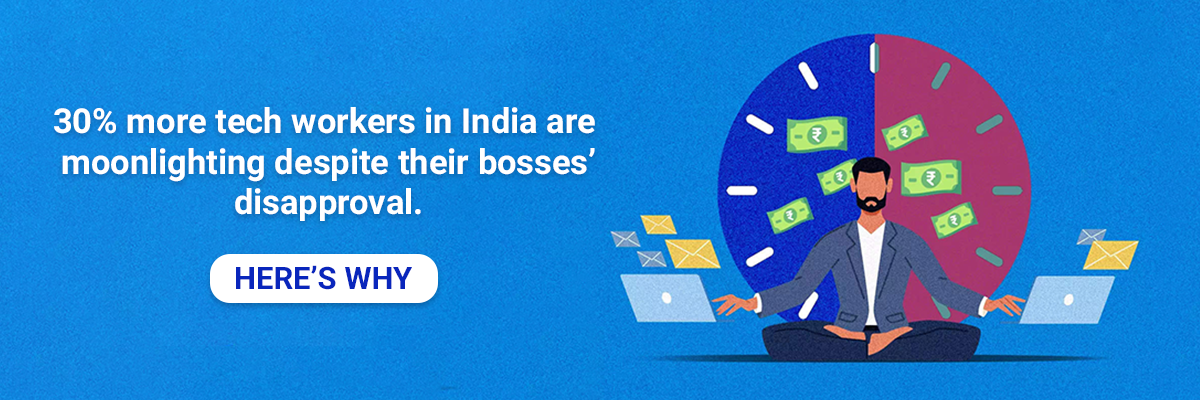Business
30% more tech workers in India are moonlighting despite their bosses’ disapproval. Here’s why.
Published
9 months agoon

There’s a troubling trend emerging in India’s IT sector, and it demands attention. Over the last three years, there has been a staggering 25-30% surge in moonlighting activities, as reported by Randstad India. This shift indicates a significant change in the job landscape, moving from an employer-driven market to a talent-driven one, as stated by Viswanath PS, MD and CEO of Randstad India, as cited in a CNBC report.
For those who may not be familiar, moonlighting refers to the practice of holding a second job or engaging in additional work beyond one’s primary employment. The concept of moonlighting encompasses various avenues, such as freelancing, part-time jobs, consulting, or even starting a side business.
It provides individuals with the opportunity to explore diverse interests, earn extra income, or develop new skills outside the scope of their main career. While engaging in moonlighting can be financially rewarding and personally fulfilling, it is crucial to consider any existing contractual obligations or potential conflicts of interest with one’s primary employer.
While empowerment of talent might seem positive at first glance, this dramatic shift in the job market can have deeper ramifications for the industry as a whole. It raises questions about employee loyalty, workforce stability, and the potential impact on companies’ productivity and growth.
As the job landscape evolves, striking a balance between meeting employee desires and ensuring business objectives are met becomes a critical challenge for companies in India’s IT sector. Keeping a close eye on this development is crucial to understanding its long-term effects on the industry’s dynamics and the well-being of its workforce.
According to Indeed India, IT professionals are increasingly turning to moonlighting for various compelling reasons. Sashi Kumar, Head of Sales at Indeed India, highlighted some of these factors, which encompass the need to supplement their income due to low salaries and the impact of rising inflation. Additionally, professionals seek financial independence and explore entrepreneurial endeavors, especially in the wake of pandemic-induced job security concerns.
The situation is further compounded by a revealing 2020 report from HackerRank, which disclosed a significant salary disparity between Indian developers and their counterparts in the U.S. On average, Indian developers earn about $38,000 annually, while their U.S. counterparts receive almost three times that amount.
Sashi Kumar attributed this growing trend of moonlighting to the core issue of inadequate compensation for software developers relative to the amount of work they put in. If they were paid fairly, many professionals might not resort to moonlighting as a means of bridging the income gap.
The COVID-19 pandemic has also played a significant role in the surge of moonlighting, as remote work became the norm. Viswanath further explained that with employees working from home, employers have limited ability to closely monitor their activities, creating an environment conducive to engaging in additional work.
According to Indeed’s Kumar, moonlighting is another workplace movement that has gained momentum over the past few years due to the evolving meaning of work, as the report mentioned.
“These movements reflect a changing mindset among young professionals, who no longer see going above and beyond at work as beneficial,” he added. “This shift has led to trends focused on work-life balance, flexibility, and breaking away from the traditional 9-5 model.”
All things considered, these factors raise concerns about the financial well-being of IT professionals in India and underscore the need for fair compensation and support for remote workers. Understanding the underlying reasons behind moonlighting can provide valuable insights to address the challenges faced by the industry and its workforce
A ‘Trend’ Not Going Off soon?

According to the 2023 research conducted by Randstad, the inclination among employees to pursue moonlighting opportunities remains strong and shows no signs of fading, regardless of whether it’s considered a passing trend.
The study revealed that an overwhelming 9 out of 10 employees expressed that an employer becomes significantly more appealing if they permit their workers to engage in additional jobs.
Moreover, the desire to seek a second job is notably higher among women, with 92% showing interest, compared to 89% among men. This difference highlights the persisting gender pay gap, as identified by Randstad.
In essence, the data underlines the enduring allure of moonlighting for employees and underscores the potential attractiveness of employers who accommodate such arrangements. The fact that women appear to be more drawn to these opportunities may serve as a poignant reminder of the ongoing challenges related to gender pay disparity.
Why do companies disagree with Moonlighting?
Here’s where employers disagree: Moonlighting goes against the sense of loyalty a company wishes to instill in its employees.In some cases, the practice could be unethical.
IT services giant Wipro, for example, fired 300 employees last year for allegedly “working for rival companies,” according to local reports. Its chairman shot down the practice of moonlighting in a tweet: “This is cheating — plain and simple.”
While the moonlighting or side hustle phenomenon is not new, it presents “unique challenges” in India due to prevailing norms and company policies, said Indeed’s Kumar.
“Unlike in some other countries, where side-hustling is more accepted, many Indian companies have stringent contracts or policies that discourage employees from working elsewhere,” he added, as per the report.
“Moonlighting is often perceived as conflicting with company interests, potentially leading to disengagement, productivity loss, and breaches of confidentiality.”
Employers’ concerns are not unfounded, said Viswanath, especially in the IT sector. “The sector is very data-oriented, and there is a lot of intellectual property that is involved,” he added. However, the negative perception that employers have towards moonlighting stems largely from their mindset and the lack of trust between employer and employee.
That has resulted in many companies including exclusivity clauses in contracts, stipulating that employees cannot pursue a side hustle, even if it’s in a different industry or simply a hobby.
You may like
-


Indian Government’s Crackdown on Social Media: A Threat to Free Speech
-


The Simpsons did it again! This time foreseeing Apple’s latest technological innovation – The Apple Vision Pro
-


Dilip Venkatraman was promoted to SVP and business head for Media and Entertainment at Tech Mahindra
-


Swati Bhattacharya steps down as FCB India CCO
-


Lodha Ventures onboards Mahesh Shah as President of Corporate Communications
-


Nippon India Mutual Fund names Kaiyomurz Daver as Chief Marketing Officer


